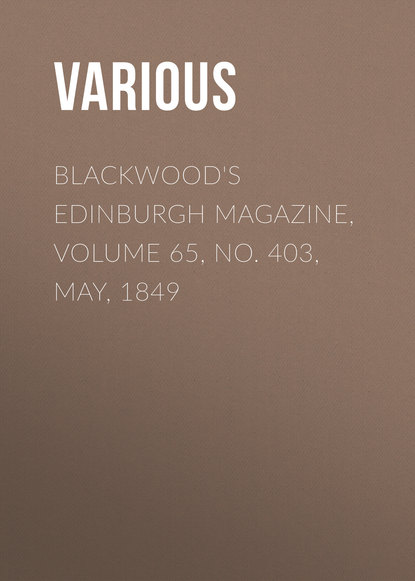По всем вопросам обращайтесь на: info@litportal.ru
(©) 2003-2024.
✖
Blackwood's Edinburgh Magazine, Volume 65, No. 403, May, 1849
Автор
Год написания книги
2017
Настройки чтения
Размер шрифта
Высота строк
Поля
That the presbytery has the power of insisting upon qualifications supplementary to those prescribed by the heritors, was decided, we think about a dozen years ago, in the case of Sprouston.
18
The Church herself, to a considerable extent, supplements deficiencies in the legal school provision by means of her "Education Scheme," whose object and efficiency may be partly gathered from the two first sentences of the last report of the managing committee: —
"The schools under the charge of your committee (as has often been stated) are intended to form auxiliaries to the parish schools, not to compete or interfere with these admirable institutions; and, accordingly, are never planted except where, owing to local peculiarities, it is impossible that all the youth of the district requiring instruction can be gathered into one place. While much needed, your schools continue to be most useful; and, indeed, by the divine blessing, they appear to have been rendered eminently beneficial.
"The number of schools under the care of your committee may be reported of thus: – Those situated in the Highlands and Islands, 125; those in the Lowlands, 64; and those planted at the expense of the Church of Scotland's Ladies' Gaelic School Society, and placed under your committee's charge, 20; in all, 209."
19
Reise nach dem Ararat und dem Hochland Armenien, von Dr Moritz Wagner. Mit einem Anhange: Beiträge zur Naturgeshichte des Hochlandes Armenien. Stuttgart und Tübinger, 1848.
20
Reise in der Regentschaft Algier in den Jahren 1836-8. 3 volumes. Leipzig, 1841.
21
The Armenian Christians abound in traditions respecting Noah and his ark. We have already mentioned the one relating to Arguri, which he is said to have founded, and which should therefore have been the oldest village in the world, up to its destruction in 1840 by an earthquake and volcanic eruption, of which Dr Wagner gives an interesting account. The simple and credulous Christians of Armenia believe that fragments of the ark are still to be found upon Ararat.
22
This eccentric old soldier and author, who calls himself the Hermit of Gauting, from the name of an estate he possesses, is not more remarkable for the oddity of his dress and appearance, than for the peculiarities and affected roughness of his literary style, and for the overstrained originality of many of his views. In his own country he is cited as a contrast to Prince Puckler Muskau, the dilettante and silver-fork tourist par excellence, whose affectation, by no means less remarkable than that of the baron, is quite of the opposite description. Von Hallberg's works are numerous, and of various merit. One of his most recent publications is a "Journey through England," (Stuttgard, 1841.) The chief motive of his travels is apparently a love of locomotion and novelty. When travelling with Dr Wagner, he took little interest in his companion's geological and botanical investigations, and directed his attention to men rather than to things. After passing the town of Pipis, three days' journey from Tefflis, the country and climate assumed a very German aspect, strongly reminding the travellers of the vicinity of the Hartz Mountains. "It is folly," exclaimed old Baron Hallberg, almost angrily, "perfect folly, to travel a couple of thousand miles to visit a country as like Germany as one egg is to another." "I really pitied the old man, who had daily to support the rude jolting of the Russian telega, besides suffering greatly from the assaults of vermin, and who found so little matter where with to fill his journal." —Reise nach dem Ararat, &c., p. 15.
23
Une Visite â Monsieur le Duc de Bordeaux. Par Charles Didier. Paris: 1849. Dieu le Veut. Par Vicomte d'Arlincourt. Paris: 1848-9.
24
Videlicet– the Dean's apartment; a visit to which frequently concludes by the visitor's finding himself "gated," i. e., obliged to be within the college walls by 10 o'clock at night; by this he is prevented from partaking in suppers, or other nocturnal festivities, in any other college or in lodgings.
25
Be not indignant, ye broader waves of Thames and Isis! In the number of contending barks, and the excitement of the spectators of the strife, Cam may, with all due modesty, boast herself unequalled. To the swiftness of her champion galleys ye have yourselves often borne witness.
26
The most fashionable promenade for the "spectantes" and "spectandi" of Cambridge.
27
"Narratur et prisci Catonis
Sæpe mero caluisse virtus." – Horace, Odes.
28
Virgil, Æneid, i. 415.
29
It was the fanciful opinion of Hume that the purer Divinities of pagan worship, and the system of the Homeric Olympus, were so lastingly beautiful, that somewhere or other they must, to this hour, continue to exist.
30
Chiefly by marriage with princesses who were heirs to these kingdoms and principalities. It was thus that Hungary, Bohemia, and the Tyrol were acquired. Hence the lines —
"Bella gerant alii; tu, felix Austria, nube:
Nam quæ Mars aliis, dat tibi regna Venus."
You, Austria, wed as others wage their wars;
And crowns to Venus owe, as they to Mars.
It was by marriage that the Saxon emperor, Otho the Great, acquired Lombardy for the German empire.
31
The acts passed by the diet are numbered by articles, as those of our parliament are by chapters. Each of these articles, when it has received the royal assent, becomes a statute of the kingdom, in the same manner as with us, and of course equally binds the sovereign and his subjects.











